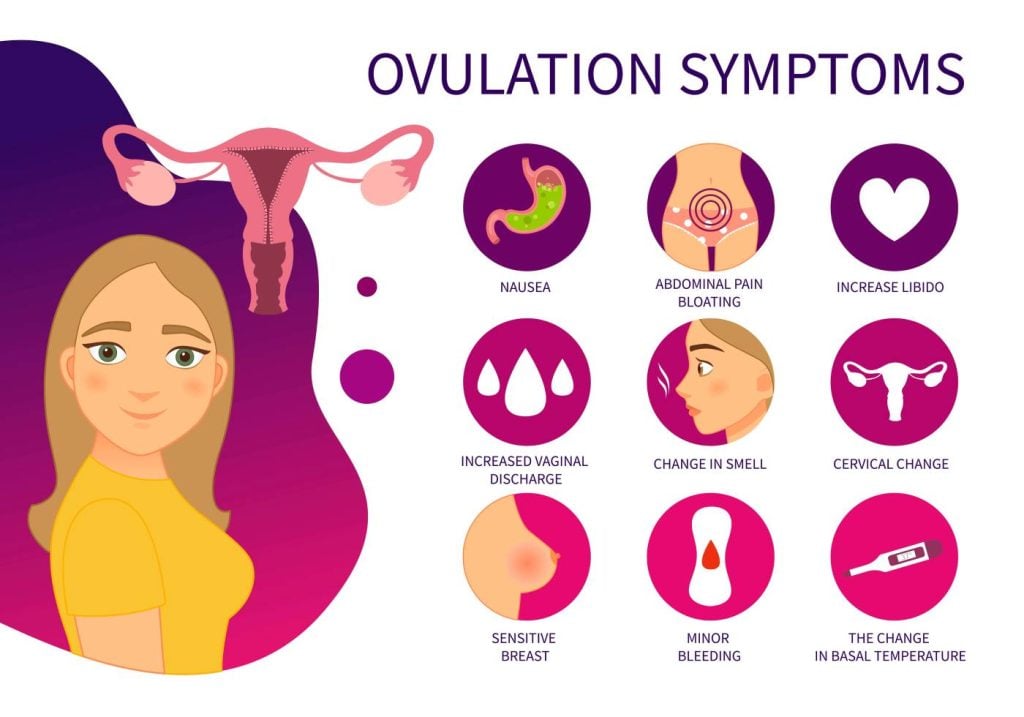
Ovulation and pregnancy are two fundamental biological processes in a woman’s reproductive life. Understanding ovulation symptoms and early pregnancy signs is crucial for women who want to conceive or simply wish to better understand their menstrual cycle.
This article explores these topics in detail, providing insights into recognizing each of these phases.
What Is Ovulation?
Ovulation is the process in which an ovary releases a mature egg, typically occurring around the midpoint of a woman’s menstrual cycle.
This moment is critical for fertility since the egg must be fertilized by a sperm cell to result in pregnancy.
The menstrual cycle usually lasts around 28–32 days, though this can vary among women. It consists of the following phases:
- Menstrual Phase: Begins with menstruation and lasts approximately 3 to 7 days.
- Follicular Phase: Follows menstruation and involves the maturation of ovarian follicles.
- Ovulation: Typically occurs between days 14 and 16 of the cycle.
- Luteal Phase: Begins after ovulation and lasts until the next menstrual cycle starts.
What Are the Symptoms of Ovulation?
Some women experience symptoms during ovulation that help them identify their most fertile period. These may include:
- Increase in Basal Body Temperature: After ovulation, basal body temperature slightly increases due to progesterone. Tracking your temperature can help indicate ovulation.
- Changes in Cervical Mucus: Cervical mucus may become clearer and more elastic during ovulation, making it easier for sperm to travel and fertilize the egg.
- Ovulation Pain: Some women feel mild, sharp pain, comparable to the pinch of a needle, on one side of the abdomen. This is known as mittelschmerz, which can last from a few minutes to several hours.
- Increased Sexual Desire: Hormonal changes during ovulation can lead to heightened libido in some women.
- Breast Tenderness: Hormonal fluctuations can make breasts feel tender or slightly sore around ovulation.
- Light Spotting or Bleeding: Occasionally, women may notice slight spotting caused by the follicle’s rupture during ovulation.
What Are the Early Signs of Pregnancy?
If ovulation leads to fertilization, pregnancy might occur. Early pregnancy signs can vary between women, but the most common include:
Missed Period
This is perhaps the most evident sign that may indicate pregnancy. If you have a regular menstrual cycle and experience a delay in your period, it could be a sign of pregnancy.
Breast Sensitivity and Changes
Similar to ovulation, many women experience breast tenderness. However, during pregnancy, this sensitivity and discomfort may be more intense, and the breasts might feel swollen.
Nausea and Vomiting
Morning sickness is one of the most common signs of pregnancy, particularly during the first trimester. These episodes of nausea, which don’t always occur in the morning, can happen at any time of day and typically start between the 6th and 8th weeks of pregnancy.
Fatigue
Many women report feeling more tired than usual, especially in the early weeks of pregnancy. This fatigue and drowsiness may be linked to hormonal changes in the body.
Increased Urination
As pregnancy progresses, women may feel the need to urinate more frequently due to the growing uterus pressing on the bladder.
Changes in Appetite
Some women notice food cravings for certain items or aversions to others. These changes are again attributed to hormonal fluctuations during pregnancy.
Emotional Changes
Emotional ups and downs are another common pregnancy sign, caused by hormonal changes. It is entirely normal to feel more sensitive during this time.
Pregnancy Tests
If you suspect you might be pregnant, taking a pregnancy test can provide accurate results.

How to Differentiate Between Ovulation Symptoms and Pregnancy Signs
Ovulation symptoms and early pregnancy signs can sometimes be confusing, as they may overlap. The key lies in the timing and duration. Just as ovulation symptoms occur in the middle of the menstrual cycle, the signs of pregnancy appear after fertilization. Regarding duration, ovulation symptoms are generally shorter, while pregnancy symptoms persist and may even intensify over time. Taking a pregnancy test is the most reliable way to confirm pregnancy and clear up any doubts.
Tracking Your Menstrual Cycle When Trying to Conceive
If you’re trying to get pregnant or simply want to understand your body better, tracking your menstrual cycle can be helpful. Here are some tips:
- Use a menstrual tracking app to monitor your cycle, symptoms, and fertile days.
- Record your basal body temperature daily upon waking to identify ovulation patterns.
- Observe changes in your cervical mucus, paying attention to its consistency and appearance throughout your cycle to pinpoint fertile days.
Recognizing ovulation symptoms and early pregnancy signs is essential for women aiming to understand their reproductive health. Every woman is unique, and these experiences can vary. Staying informed allows you to make empowered decisions about your body and reproductive goals.
If you have any concerns or questions, don’t hesitate to consult a specialist who can guide and support you on your journey. Knowledge is power, and understanding your body is the first step toward a healthy reproductive life. If you want to book a consultation with an IVI specialist, call us or fill the web formular, and our team will call you back.





Comments are closed here.